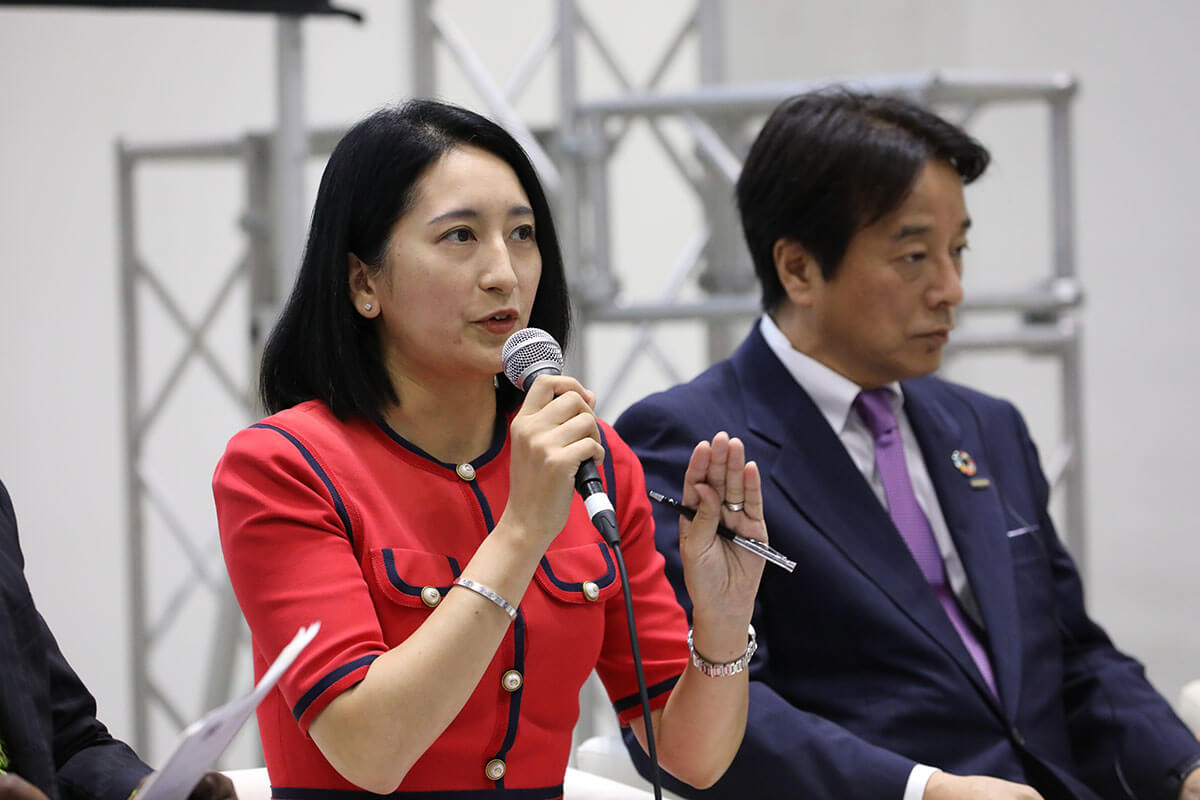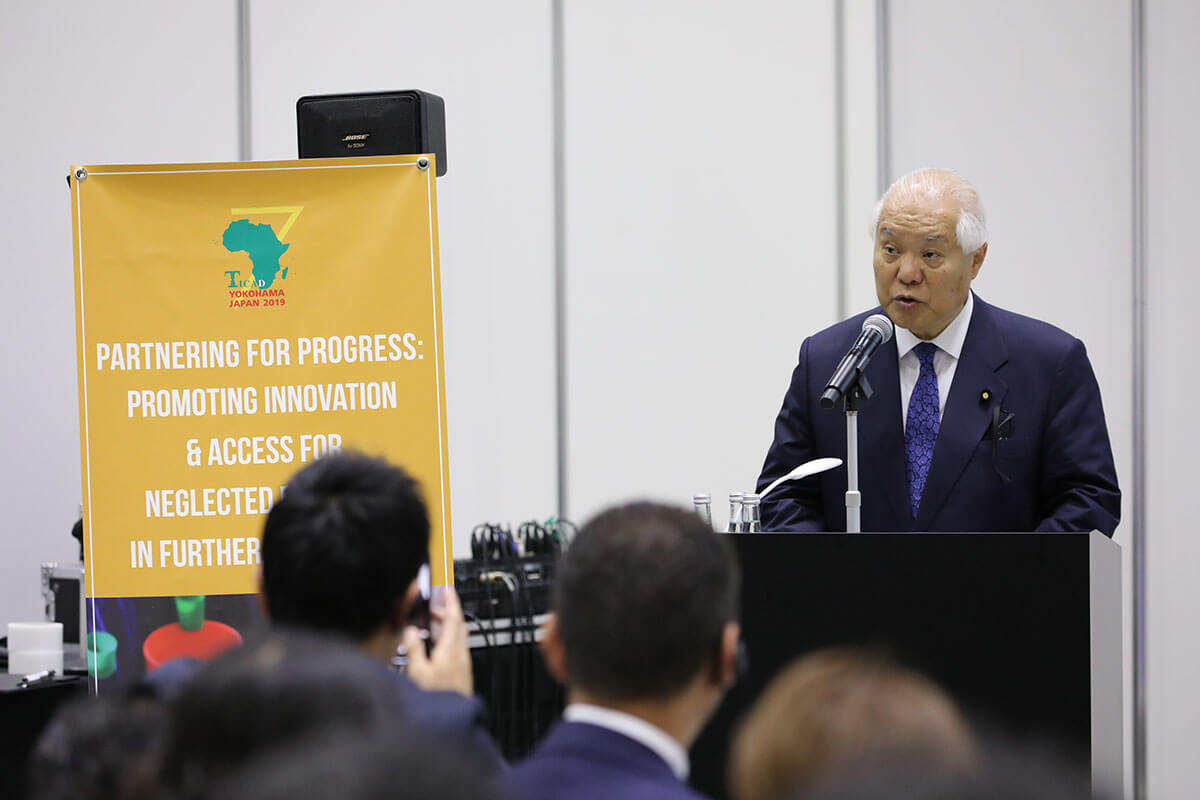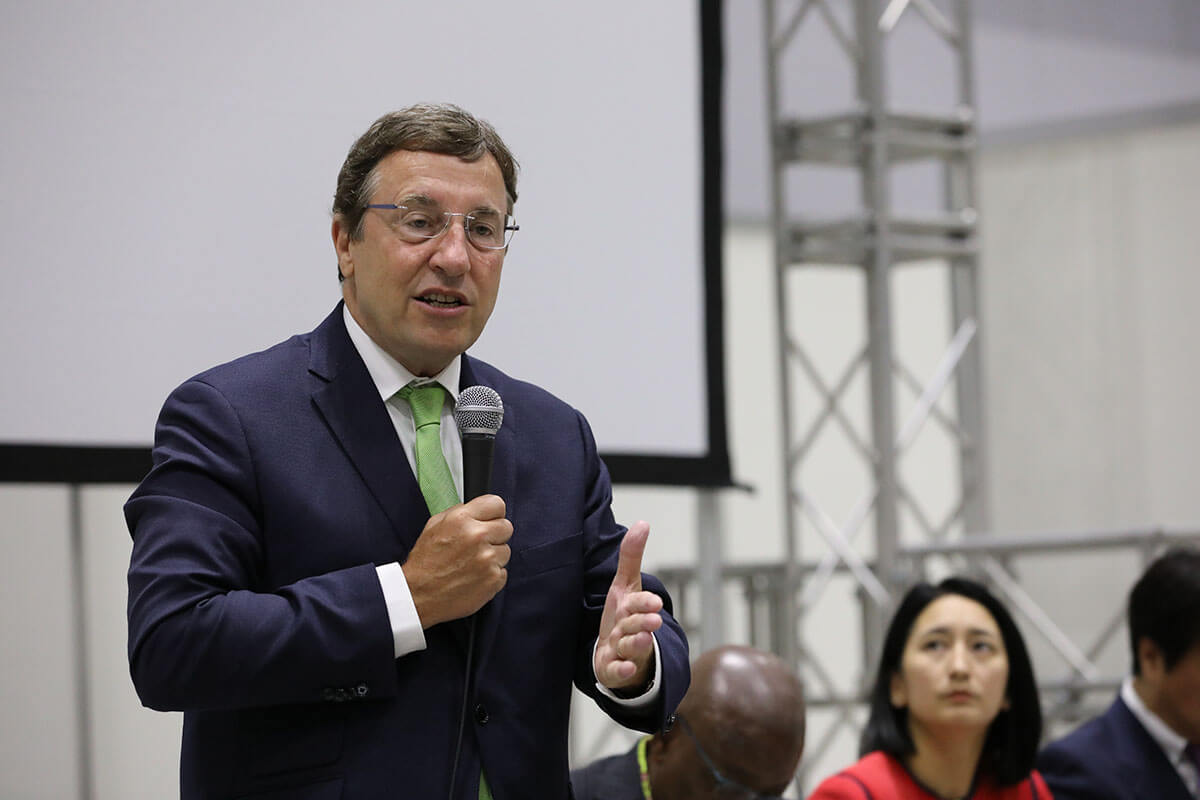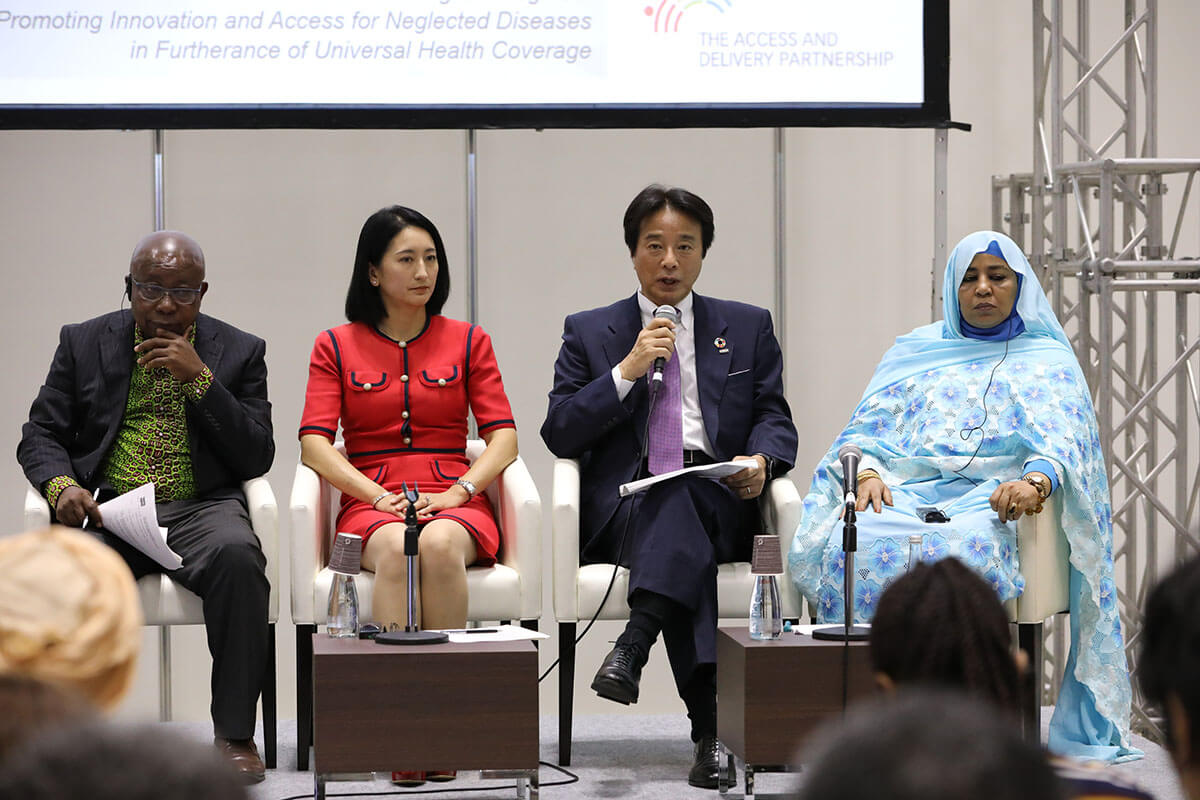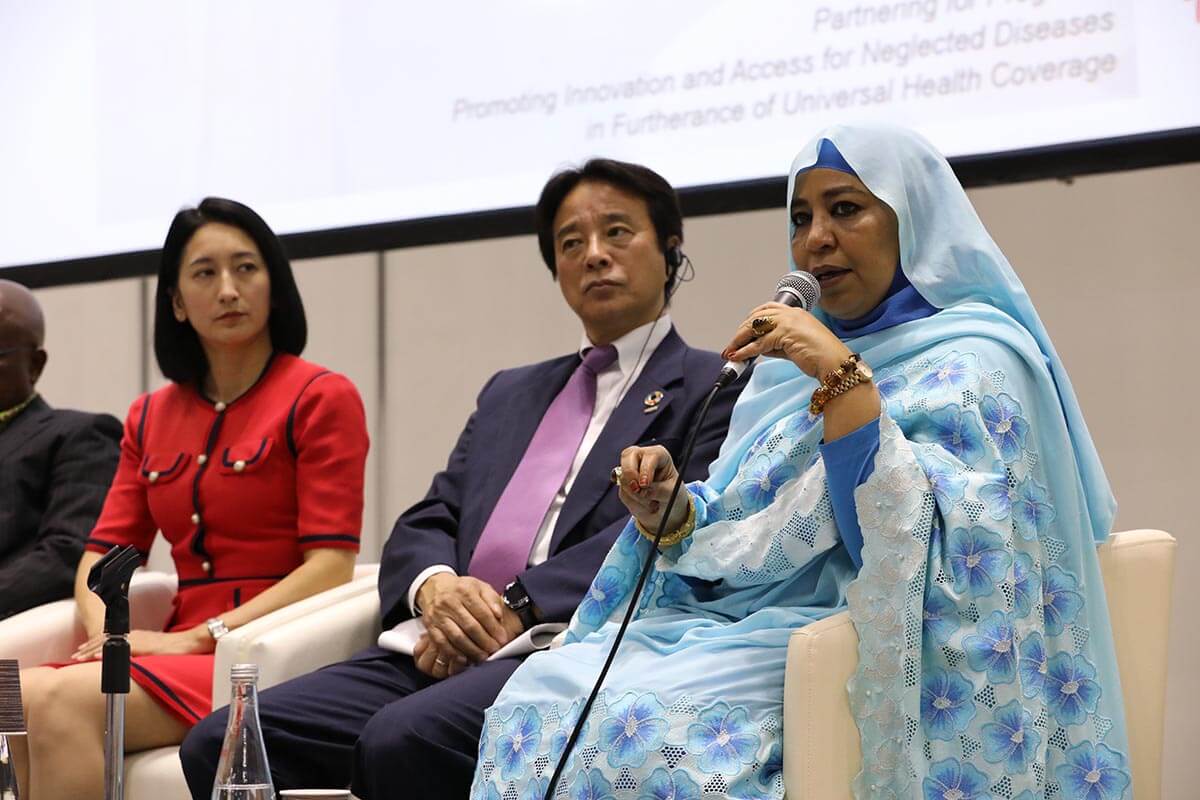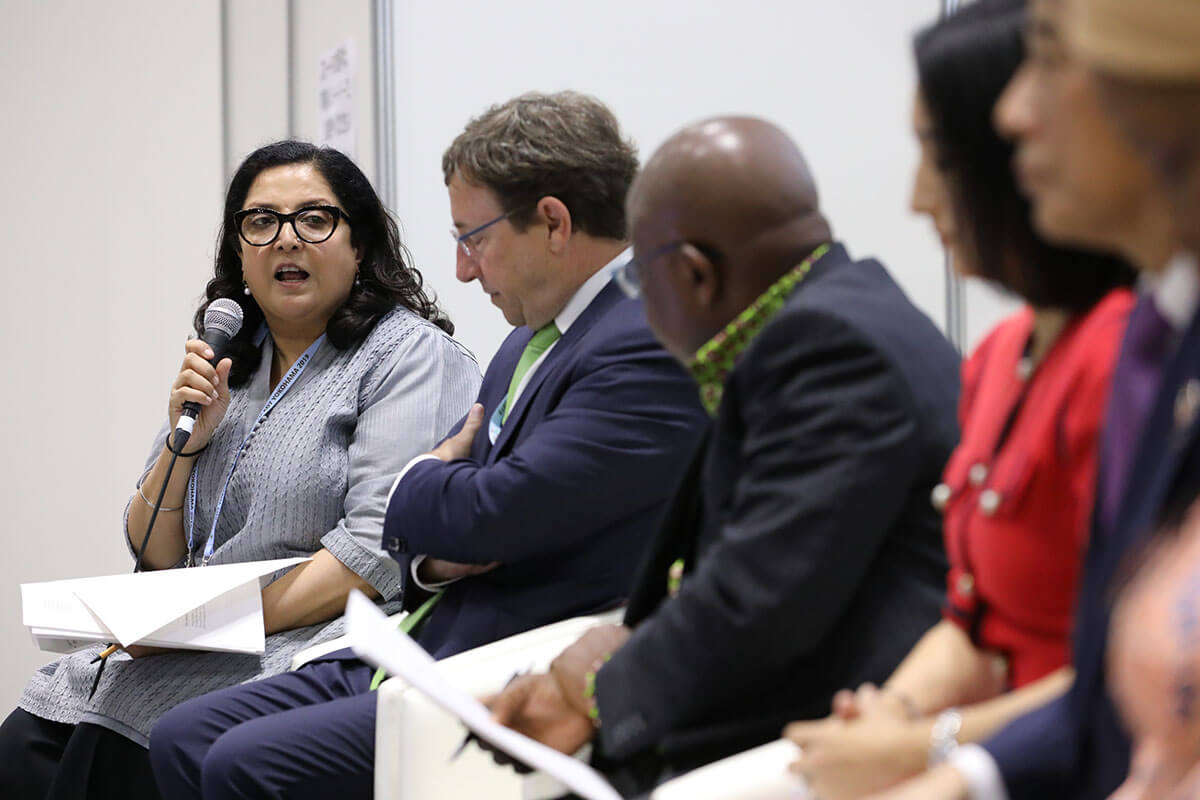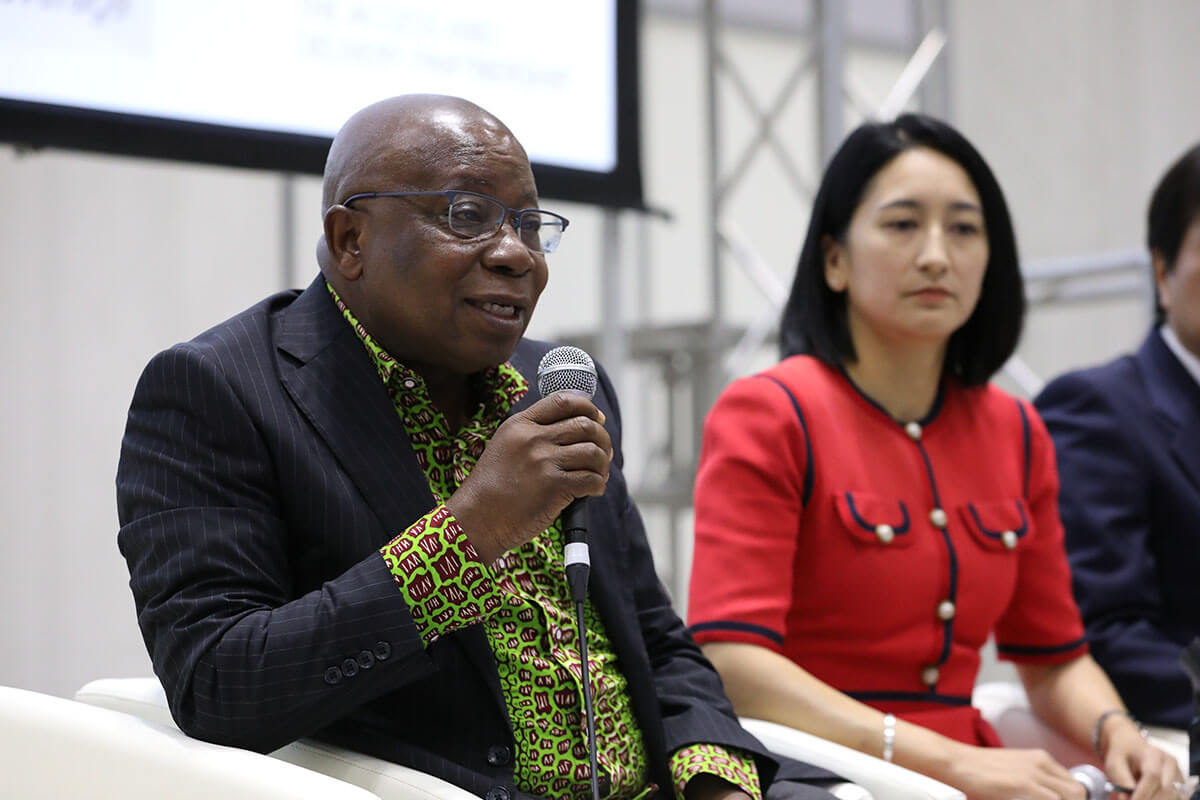Cover photo: Mandeep Dhaliwal, Director of UNDP’s HIV, Health and Development Group, speaks in a panel discussion at the Partnering for Progress: Promoting Innovation and Access for Neglected Diseases in furtherance of Universal Health Coverage side event at the Seventh Tokyo International Conference on African Development, held in Yokohama, Japan from 28-30 August 2019.
Photos credit: Masaki Kosakai.
Yokohama – New partnerships and investments are vital to making universal health coverage in Africa a reality, said high-level experts at a side event at the Seventh Tokyo International Conference on African Development (TICAD7). The event was held to highlight innovative efforts to match research and development for new medicines, vaccines diagnostics and other technologies for neglected diseases with access and delivery for those in need.
Top officials from the UN, Ghana, Japan’s Parliament and the African Union (AU), along with representatives from industry and experts in innovation and health policy, joined forces in describing cross-cutting efforts to advance universal health coverage in Africa. It was hosted by the United Nations Development Programme (UNDP) through the Access and Delivery Partnership (ADP), the Global Health Innovative Technology Fund (GHIT Fund) and the United Nations Volunteers (UNV) programme, and moderated by Mandeep Dhaliwal, Director of UNDP’s HIV, Health and Development Group.
The joint vision comes at a critical moment in the lead-up to the UN High-Level Meeting on Universal Health Coverage, scheduled to take place during the annual UN General Assembly (UNGA) in late September.
“Many of the world’s poorest and most vulnerable people still do not enjoy access to the medicines, vaccines and diagnostics needed for good health and well-being,” said Achim Steiner, UNDP Administrator. “In some cases, effective health technologies may not exist for diseases that disproportionately affect developing countries.” Steiner noted that many of the medicines, vaccines and diagnostics needed to combat neglected diseases are not being developed simply because the economy of drug research and development is today so out of sync with many health needs. “Significant investment as well as new partnerships are critical to address this gap,” said Steiner.
The panel discussion at the side event featured: Achim Steiner, UNDP Administrator; Senator Keizo Takemi, House of Councillors, Japan/WHO Goodwill Ambassador for UHC; Catherine Ohura, CEO, GHIT Fund; Kaoru Terashima, Corporate Vice President Deputy General Manager Medical System Business Division Fujifilm; Hon. Kwaku Agyeman-Manu, Minister of Health, Ghana; and HE Amira Elfadil, Commissioner of Social Affairs, African Union. Photos: Masaki Kosakai.
The Government of Japan is partnering with UNDP through two initiatives that promote R&D for unmet health needs and enable access to needed health technologies in low- and middle-income countries (LMICs). The GHIT Fund stimulates investments and global partnerships aimed at developing new health technologies for tuberculosis (TB), malaria, neglected diseases and others. The ADP provides technical assistance to LMICs to support accelerated introduction of affordable and quality medicines, vaccines and diagnostics.
Senator Keizo Takemi of the House of Councillors, Japan, and World Health Organization Goodwill Ambassador for UHC, has been a leader in recognizing health as a prerequisite for inclusive economic growth and human security. He said the complementary nature of the GHIT and ADP initiatives is “driving health technology innovation for TB, malaria, neglected tropical diseases and other diseases on the one hand, and strengthening health systems to promote access and delivery, on the other. This represents a strategic approach of the Government of Japan towards achieving UHC.”
Takemi mentioned a global platform launched in January 2019, Uniting Efforts for Innovation, Access and Delivery, which will further enhance engagement between other biomedical R&D funders, product development partnerships and key actors engaged in improving access and delivery.
“UHC financing is now the big priority,” he said, and innovation, access and service delivery must be taken into account. The aim is to combine to create a conceptual framework to allow each partner to more easily collaborate, and create good governance, which requires political leadership, he said. TICAD7 is strengthening leadership among Japan, heads of state in Africa, and several heads of UN agencies, he added, reconfirming Japan Prime Minister Shinzo Abe’s “stable” commitment to global health including in Africa.
Catherine Ohura, CEO of the GHIT Fund, highlighted the importance of partnership, local expertise, and innovation. The GHIT Fund is an example of a unique public-private partnership, she said, in that it is funded by the Japanese Government through UNDP, the pharmaceutical and healthcare industries, the Bill & Melinda Gates Foundation and the Wellcome Trust.
The GHIT Fund works to incentivize companies to engage in global health R&D by leveraging external resources. It is important to partner with companies that have technologies but are unable to connect them to the global health arena, she said. Ohura gave what she called the “beautiful” example of the successful application of Fujifilm’s existing photographic development technology to a sensitive rapid diagnostics kit based on using urine samples to detect TB. The details of technology were elaborated by Kaoru Terashima, Fujifilm’s Corporate Vice President, who also shared that their effort could not have been undertaken alone and echoed the importance of partnerships.
“When you put the partners together and think creatively outside the box, that’s when innovation happens,” Ohura said. “It’s not about creating new things always. It’s really about creating new thoughts, connecting different things, perhaps things that already exist, that leads to innovation.”
The same goes for clinical trials, she said. Clinical trials funded in Africa lead to other added benefits such as increasing capacity building for local healthcare professionals, improving clinical expertise, and more which can be transferred for any future clinical trials and healthcare delivery. The added benefits contribute to building and expanding universal healthcare in African nations, said Ohura.
Kwaku Agyeman-Manu, Minister of Health of Ghana, discussed Ghana’s successful range of partnerships and its progress toward achieving universal health coverage, which he said the country is “very, very close to achieving.” He talked about the types of incentives that can be put in place to make it an attractive proposition for partners, and the kinds of policies governments can implement to finance access to medicines and technologies.
The minister described the National Health Insurance Levy, which he called a “major source of funding.” But there are challenges going forward, he said, with costs rising, and new threats such as non-communicable diseases gaining prominence.
HE Amira Elfadil, Commissioner of Social Affairs for the AU, said that effective regional platforms are essential for policy coherence and regulatory harmonization. She highlighted a range of initiatives being promoted by the AU Commission, such as the continental health policy for 2016-2030, the Catalytic Framework to end HIV, TB and Malaria, the establishment of Centers for Disease Control, and the adoption of the African Medical Agency this year that is set to improve the regulation of medicines, medical products and medical technologies. African initiatives will rely on partnerships and the “very important” involvement of the private sector, she said.
“A healthy population is a foundation for any economic prosperity in Africa,” said HE Amira Elfadil.
Toily Kurbanov, UNV Deputy Executive Coordinator, in describing the UNV programme highlighted the essential work of volunteers in advancing health issues. He cited an example of UNV partnering with ADP and others in supporting the launch of a new mobile application in Ghana that facilitate drug safety monitoring.
All speakers agreed that accelerating innovation and access are critical to achieving the vision of the SDGs and that new partnerships and investments are needed to promote the development of health technologies for neglected diseases.


